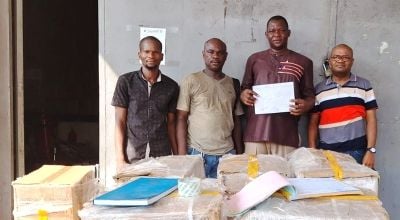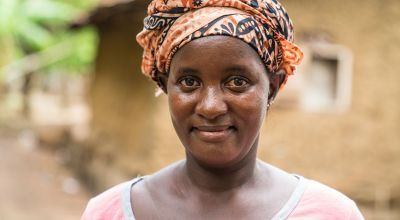
Read our 2023 annual report

Knowledge Hub
Life after Ebola in Sierra Leone
It is just over one year since Sierra Leone was declared officially Ebola free. Over the course of the outbreak there were over 14,000 suspected cases of the disease throughout the country. Almost 4,000 people died as a result. In its aftermath, Concern has been helping people to rebuild their lives.
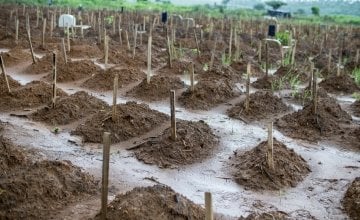
Kadiatu’s Story
Kadiatu Conteh is an Ebola survivor. She contracted the disease, but remarkably, she survived it. You might be tempted to call her one of the lucky ones, but the outbreak had heart-breaking consequences for her. She lost her two year old baby girl, along with every single member of her immediate family – her mother, her father, all of her brothers and her sister. Twelve lives lost in total. She is the only one left.
Kadiatu cries softly as she recalls learning about her family’s fate. The medical staff who nursed her back to health waited until she was being discharged before breaking the devastating news to her. They were worried about the effects it might have on her recovery if they told her any sooner. They cried as they told her.
She says that at first, she didn’t want to continue living. “I prayed to God, saying I don’t want to live. I don’t have the appetite to live in this world because my life is over.”
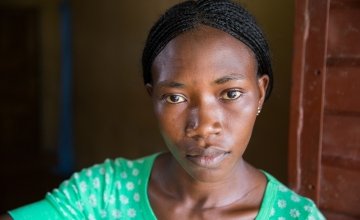
Striving for a better life
It is difficult to fathom how anyone could pick up the pieces of their life after such loss. But today Kadiatu is not just surviving, she is striving for a better life. She is completing a course in electrical installation and plans to start up a business in her village – the first of its kind there.
It has not been an easy path for Kadiatu. She did not receive the support she needed from the start. Her father had four wives, and with her immediate family members all gone, it was difficult for her to find her place in the extended family. She had no-one to encourage her or take care of her. Thankfully the wider community welcomed her back. She was not stigmatised in the way that some survivors of Ebola initially experienced. And Concern was there to help her.
"Concern have done a great thing for me. They gave me food items and offered to enroll me on the course. The course has helped me a lot because when I was discharged from the treatment centre, I was not in a good state. So I thank them. I was upset and stressed back then but now I am doing better."
Concern enrolled Kadiatu in a four month vocational training course in electrical installation at the Sierra Leone Opportunity Industrialisation Centre (SLOIC). She has since progressed into the full 18 month course. When that is finished, she has her sights set on the three year electrical engineering qualification.
Hopes for the future
“I want to be an engineer and would like to do the diploma. I dream that in 20 years’ time I will be a good person in my community – helping to improve it”.
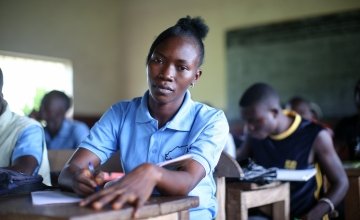
For all she has achieved, Kadiatu still struggles with the loss of her family. She misses them every day. She tells us that the mornings are the hardest for her. She doesn’t enjoy them because she feels that mornings are for families.
She hopes to one day start her own family. She would like a small family – two girls and one boy – and she is determined to provide for them when that time comes. She firmly believes that a livelihood in electrical engineering will enable her to do just that.
For now, she is enjoying learning and the camaraderie of the classroom, and is full of praise for her teacher, Mr Bangua, who she says really encourages his students. “He is the one who has given me the zeal to continue this course”, she tells us.
Gender Equality Champion
Despite enjoying such support, Kadiatu still has to challenge gender stereotypes in her chosen field. But this is no bother to her. She is something of a gender equality champion and this helped inform her decision of what career path to take.
I decided to choose electrical installation because I saw there was a need for more women in this profession. I want to promote gender quality. That’s why I’m doing electrical installation – because people say it is too hard for women. I want women to be equal and so the same as men.
Whenever her teacher tells her a task is not safe for a woman to do, her mantra is always the same - “Remember Mr Bangua, Gender Equality!” She tells us “I know if I work hard, there is nothing men can do that I cannot do”.
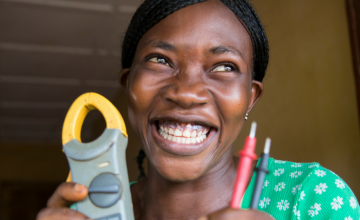
The power of support
Kadiatu’s story is one of almost super-human strength and courage. But she shows us what is possible when people receive the support and encouragement they need to get through the worst that life can throw at them.
While she will never get over the loss of her loved ones, her hard work and determination have enabled her to look to the future. “Because I started with struggles, I don’t want to end up with struggles. I want to be happy in life so that is my plan.”




